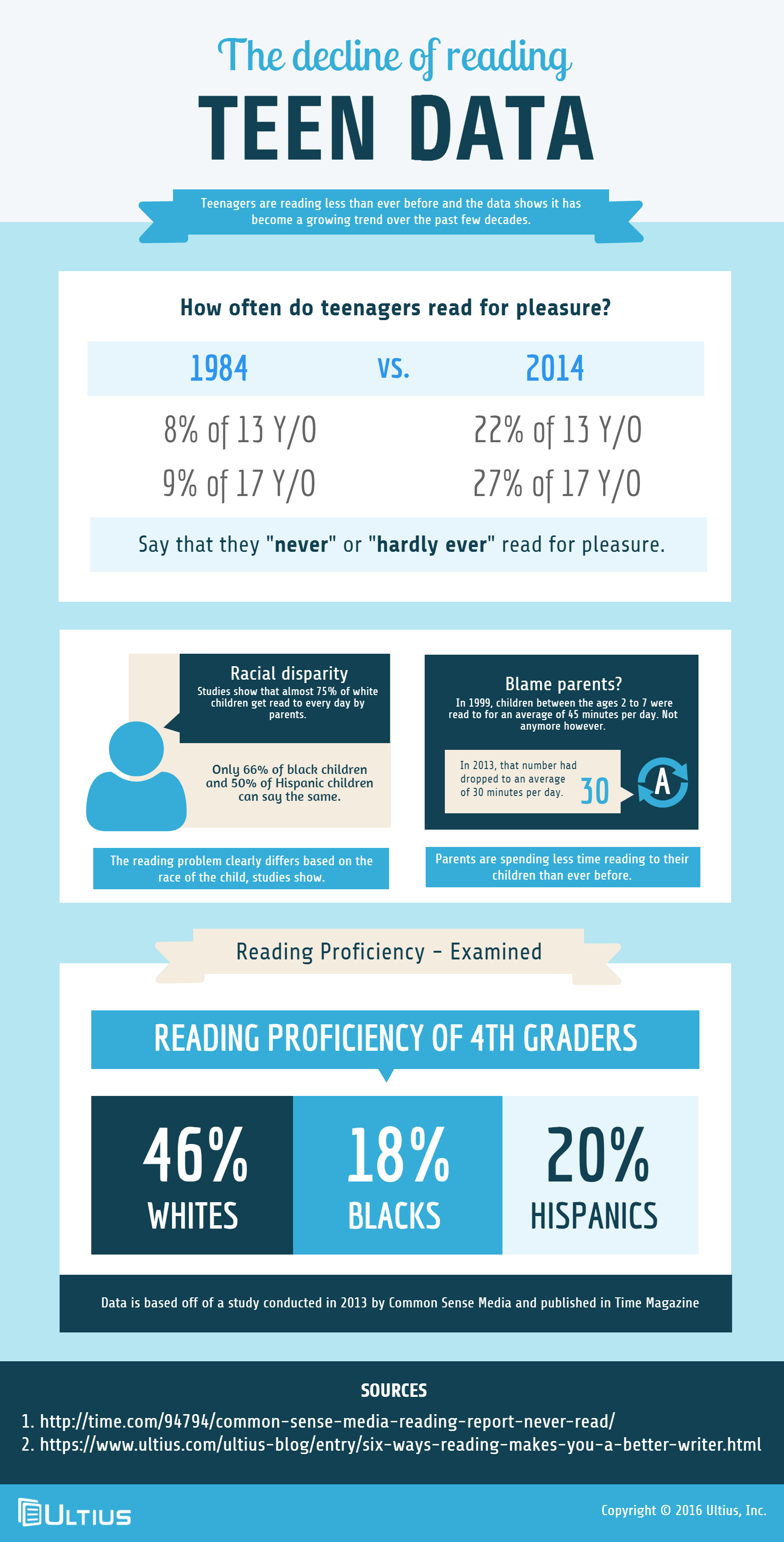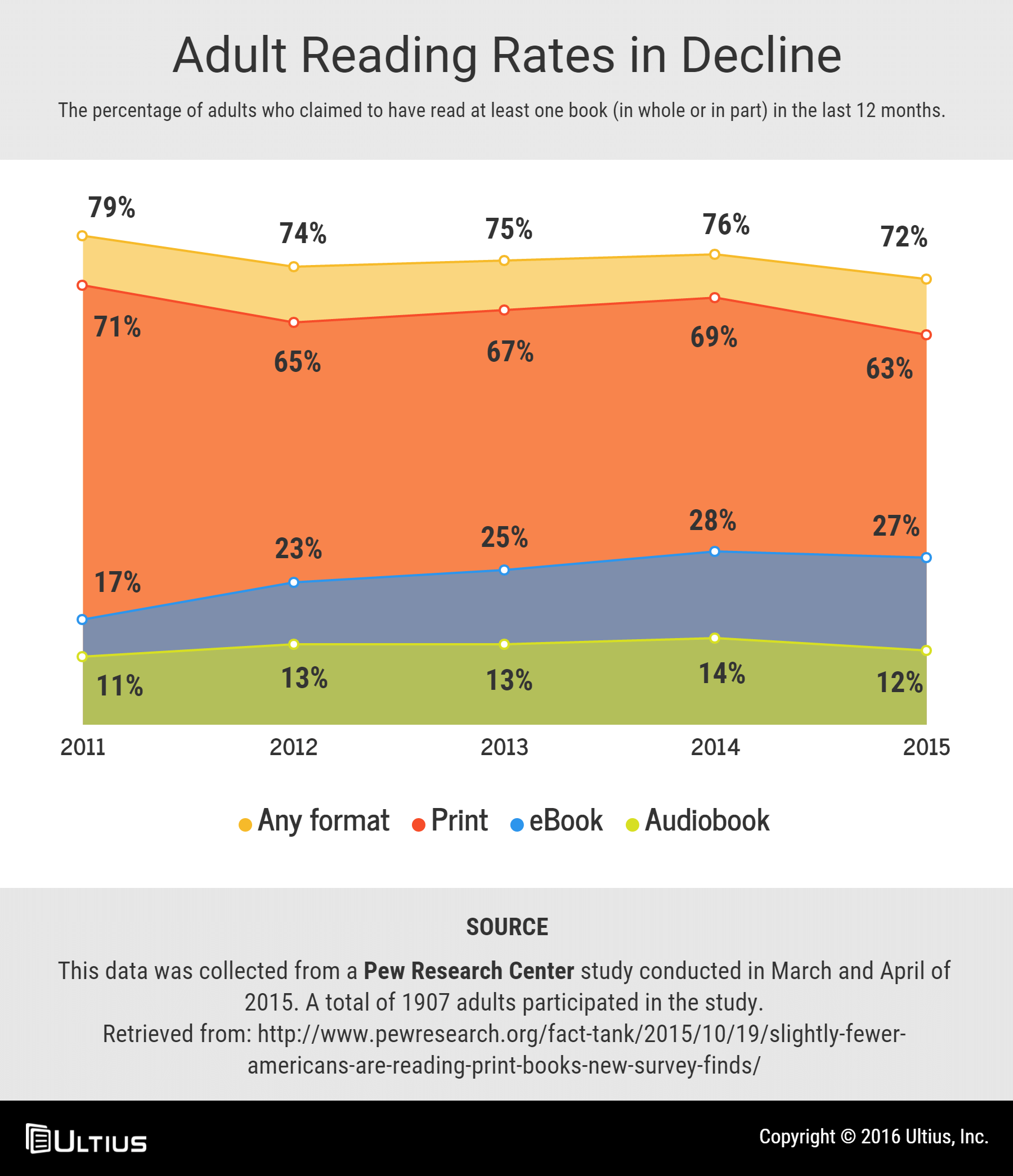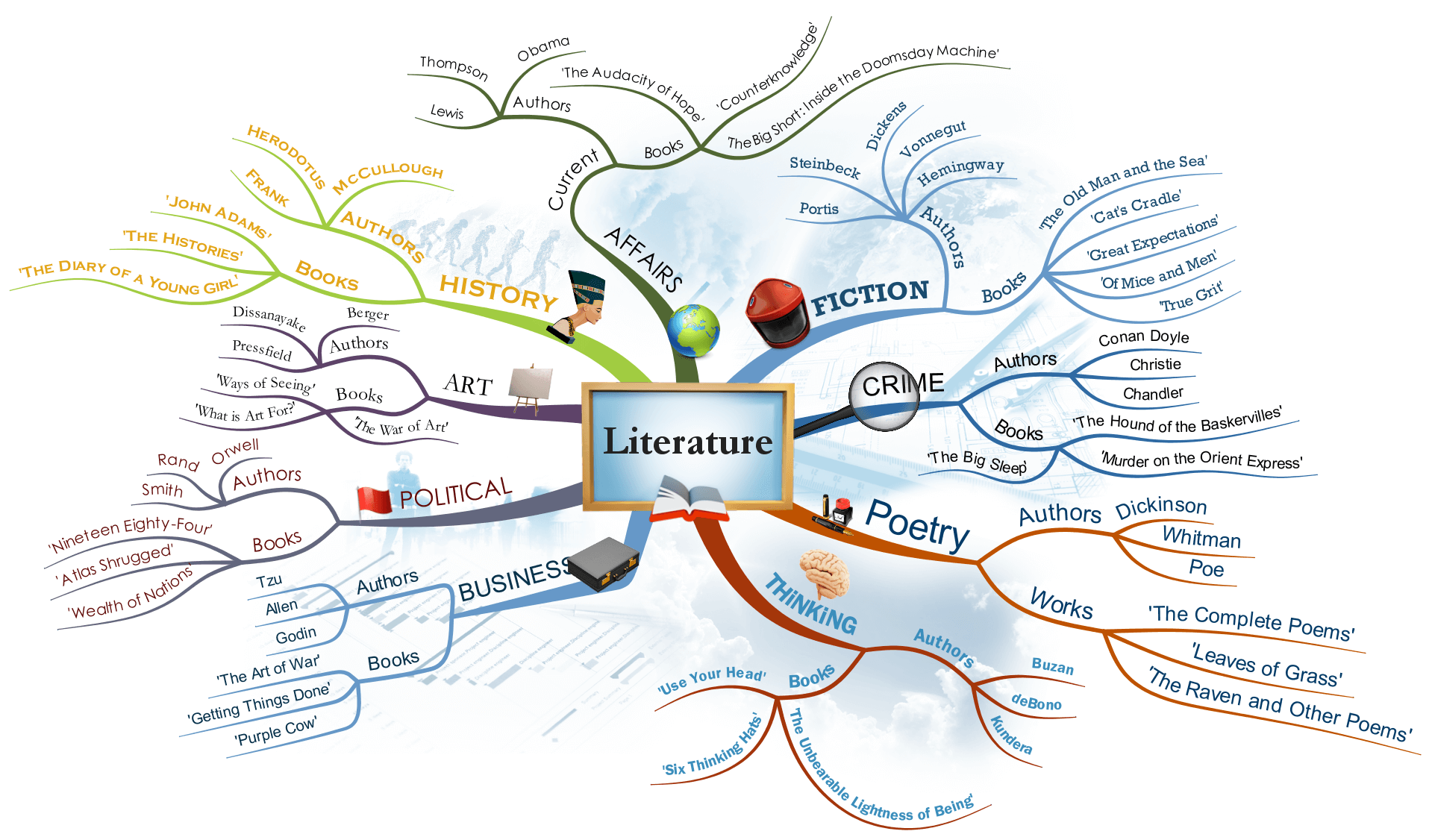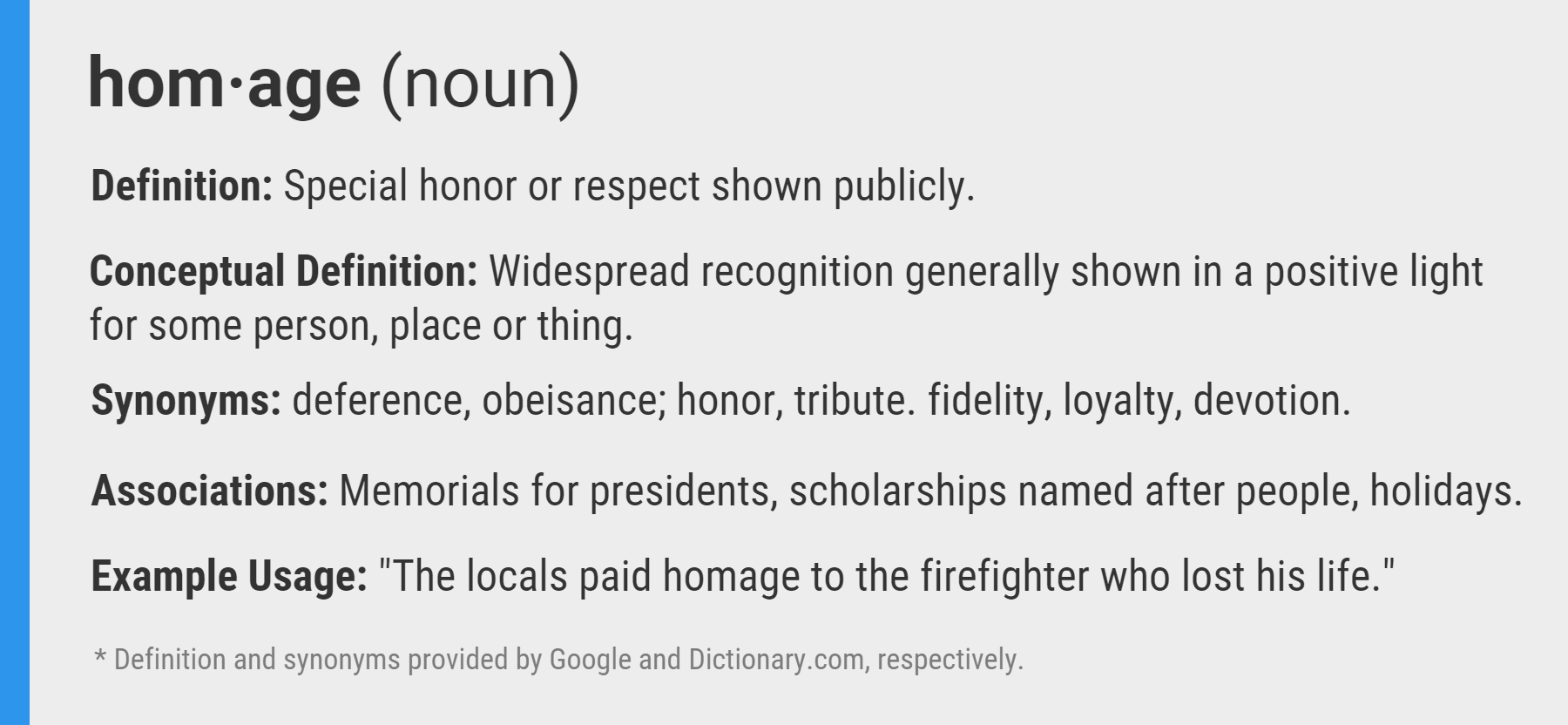Ultius Blog
6 Ways Reading Makes You a Better Writer
This article examines the important role that reading has when it comes to being a better writer. Current research on declining reading rates and other background information is discussed as well. If you want to skip the background part, jump to the reasons portion and see the six reasons why reading more will be beneficial for your writing.
Reading is the most effective way to become a better writer, and the following six ways to utilize reading will help you increase the depth, scope, and precision of your writing. Whether you write professionally, as a student, or creatively, reading is the foundation on which your writing takes root. Cultural discussion is accomplished not only through understanding what is known, but what is yet to be known. Reading is the map of discovery which can help you break through writer’s block, help you find your unique writing style, improve your vocabulary, improve cognitive cohesion, understand structure, and expand your world.
Reading is in Decline - And the Data Proves it
The act of reading goes against the current grain of popular culture, and the results show it. Popular culture is an extroverted force, choked with speed, glitter, and sensation. Reading is an introverted act which benefits you the slower you go while invigorating the imagination, empowering awareness, and helping build patience and self-resiliency. The very act of going inward, introversion, is constantly being challenged by cultural and social demands of media, entertainment, modern communication methods and the wave of the Internet’s reach. This has resulted in a sharp decline of youthful reading for pleasure, and this has resulted in plummeting literacy rates.

According to Charlotte Alter in a 2014 TIME article, this problem is seen in the demographic data:
- In 1984, 8% of 13-year-olds and 9% of 17-year-olds said they “never” or “hardly ever” read for pleasure. In 2014, that number had almost tripled, to 22% and 27%.
- Parents are also reading to their kids less than ever. In 1999, children ages 2 to 7 were read to for an average of 45 minutes per day. In 2013, that number had dropped to an average of just over 30 minutes per day.
- The researchers also found racial disparities: 75% of white children get read to every day, while only 66% of black children do and only 50% of Hispanic children.
- In 2013, 46% of white fourth graders were reading proficient, while only 18% of black students and 20% of Hispanic students were reading at grade level. (Alter)
As the data shows, teens and young children are reading less than ever. A lot of it has to do with parental influence and racial differences certainly play a role.
What About Adults?
It’s not just teens who struggle with lower rates of reading. Adults have been kicking the habit as well. According to a Pew Research Center survey, the average percentage of adults who have read at least one book in the last twelve months has declined from 79% in 2011 to 72% in 2015. The data also shows that more adults are turning to eBooks and audiobooks as a means of consuming written information. Print reading is surely declining, but other formats are growing. Going beyond reading for pleasure, data also shows that a lack of reading has resulted in disgruntled employers.

According to a CNBC editorial, employers are disappointed with the overall quality of written communication when it comes to employees. While it would be a hasty generalization to assume that a lack of reading is the sole factor responsible, a lack of reading is certainly a contributing factor. As a result, it’s important to also look at how reading eBooks and audiobooks impact writing skills and data comprehension.
eBooks and Audiobooks - Do They Count as 'Reading' in the Same Way as Print?
The decline of print media and overall rise of eBooks may have slightly helped keep adults and children reading, but research by Anne Niccoli shows that reading digital media has a distinctly different impact on brain chemistry, comprehension, and literacy application as opposed to reading traditional print. While all reading is beneficial for strengthening literacy, reading print is the most effective method.
This is largely because reading print builds your attention span, and also helps strengthen the mind/body connection which can be fragmented by too much digital use. As Niccoli remarked, the trend of eBooks is sweeping throughout education:
“As of 2014, 63 percent of colleges reported using e-textbooks, while 27 percent planned to in the near future.”
However, that is not all bad, as many studies have found that reading digitally does not damage comprehension and recall to an extreme degree. When it comes to the fluidity, focus, and authenticity (which enables reading to strengthen your ability as a writer) print remains the way to go.
Benefits of Reading - Other Than Improving Writing
Reading helps improve brain cohesion is many ways, and being a better writer is only one of the many ways that reading improves your life. The psychological effects of consistent reading include the reduction of stress and a plethora of other benefits. From increased memory, a stronger vocabulary to mood uplift, reading consistently only serves to improve your overall quality of life. Lauren Gelman of Reader’s Digest reported some of these benefits in “Benefits of Reading: Getting Smart, Thin, Healthy, Happy.”
Holistic Benefits of Reading
- Improved memory
- Longer workouts as you distract your body from the treadmill or elliptical
- Stress reduction
- Catalyst against late-stage brain disorders such as Alzheimer’s
- More empathy and compassion through shared experience
- A better vocabulary (especially when parents start reading with their childern early)
- Shared connection with humanity
- Better moods
- Reading saves money (considering the cost of a book compared to how many hours of value you derive from it)
As you can see, reading doesn’t just help you professionally, it also helps you in terms of health and other life priorities. But most importantly (with respect to this article), it is widely understood and accepted that to be a proficient writer, reading consistently is necessary.
Writing is engaging in cultural conversation, and the means of understanding where the conversation: 1) has been; 2) is; and 3) could be going is gained through reading. There is so much reading to be done on almost any subject, and the pantheon of the conversation is growing all the time. Without reading, your writing has no context, and as Stephen King remarked, “If you don’t have time to read, you don’t have the time (or the tools) to write. Simple as that.” Clearly, the secret sauce for better writing is more reading.
Consequences of Not Reading Enough
In case you were thinking that avoiding paperbacks only limits your growth, think again. When you don’t read enough, there are also consequences to take into account. Reading is a primary daily activity of the brain, which is also the strongest muscle in your body (that’s why 20% of your caloric energy is allocated to the brain). When you don’t exercise that muscle (like any other one), it atrophies and impacts your overall cognitive abilities.
When you avoid reading, the following happens:
- Depreciation of confidence: You feel as though you don’t have anything worth saying and the courage to write it in your authentic voice fades.
- More Anxiety: You may become unable to focus on the core message and overwhelmed with minutia.
- Weaker Memory: Your memory will not reach its full potential and may even suffer.
Reading expands your relationship with humanity through time and space, and whatever subject you are interested in is likely something someone has written about. Feelings of being alone in a hostile universe increase a sense of worthlessness which makes the act of writing much more difficult than it has to be. Reading consistently opens you up to the plethora of opinions, styles, opinions, and options which can help strengthen your connection to yourself and those around you.
So, let’s dig into the main reasons why reading is important when it comes to improving your writing skills.
Reason #1: Reading Helps End Writer’s Block - Letting you get Back to Writing
If you are one of the many people who suffers from writer’s block, you know the worst thing to do is simply stare at the blank screen waiting for inspiration to magically appear. Distraction is often an effective way to trick your brain out of fixating on the problem at hand. Next time you are facing a writing deadline exacerbated by writer’s block, take a moment away to read a poem, a short story, or part of a novel you are interested in.
The way the writer’s words flow and transition will unconsciously unlock clues as to how you can proceed with your own writing, and ultimately the best writing is accomplished with a strong reliance on simplicity.
Writer’s block is psychological, and based on the delusion of perfectionism. However, when you read what others have written, you can see that it is the author’s confidence and simplicity that makes the work stand out, and not perfectionism.
Write simply, and say nothing more. Without forcing it, allow what you are reading to help guide you through the writer’s block.
Avoiding writer's block can be accomplished by following these steps:
- While reading, create a mind-map: jot down a few main themes of what you need to write about, and while reading jot down a few associations that come to mind. Don’t force it - allow it.
- Recognize how the writer engages you with their sentence structure, word choice, pacing, and other literary tools.
- Don’t reach for perfection. Start where you are, stay with what you know, and go from there.
- Consult an editor. If you are really stuck on something important and need help, consider working with an expert editing service provider and connect with a professional. They have been there before and know how to help.

Bonus Tip: If you are currently writing your dissertation, click here to read some dissertation-specific tips on how to overcome writer’s block.
Reason #2: Reading Helps You Explore Diverse Writing Styles
Some of the most popular and effective literary writers are those who not only have a unique writing style, but apply it in a genre where a different writing style predominates. A few examples of this successful approach are Bill Bryson (A Walk in the Woods), Brian Green (The Elegant Universe), and Jon Krakauer (Into the Wild). These writers are able to redefine the boundaries of the genre in which they write (travel, physics, and journalism), creating powerful links between many genres which allow their writing to be applicable across many boundaries. Exploring different writing styles increases your readability, the scope of your impact, and overall contribution to the cultural discussion at hand.

The Best Writers are Well-Read - And Have a Unique Voice
One thing becomes immediately clear upon reading other writers’ works - they are vastly well read. The more you read, the more capable you will be of constructing original thoughts because you will know what has been said before, its context, and how the critical approach you bring to any topic can expand with your own capacity.
As a rule of thumb, reading is one of the best ways to expand your critical capacity. Writing style is the culmination of the knowledge of grammar, cultural context, subject, and finally - the cultivation of your unique writing voice. Once you have read enough to develop your own unique voice, you will have the ability to write about many subjects in many contexts with confidence.
This benefit of reading is very helpful for those in college whose primary writing style will be research based (like for research papers). College writing and integrating concepts from many scholarly sources is strengthened and supported by a healthy reading habit. The unification between reading and writing has been observed by Judith Langer & Sheila Flihan in Writing and Reading Relationships: Constructive Tasks;
"Whether referred to as reading to write or composing from sources the readers/writers are involved in processes of reading and writing that are so integrated that boundaries between the two processes tend to blur. When writers compose from sources, reading and writing processes blend, making it difficult, if not impossible, to distinguish what is being done for purposes of reading and from what is being done for purposes of writing...we often cannot say whether a writer performs a certain operation to make meaning of the text that is read or to make meaning for the text that is being written."
This is the evolving cultural discussion in action via the intimacy of language - which is engaged through reading and writing (especially when you have to write persuasively).
Reason #3: Reading Improves Writing by Helping Improve Cognitive Cohesion
The act of reading is akin to exercising your brain, and the more this is done the more cognitively flexible, expressive, and unique your writing will become. This skill also translates into any other area of learning and expression beyond simple literacy, as a recent British Cohort Study found (as reported by The Guardian). This study was a long term investment in the question of how reading improves the brain, and was begun with 17,000 people in 1970. This group was studied throughout their development.
The Study Results Were Clear - Reading Helps Writing
According to the study (by Sullivan and others):
"6,000 people took a range of cognitive tests at age 16. We compared children from the same social backgrounds who achieved similar tested abilities at ages five and 10, and discovered that those who frequently read books at age 10 and more than once a week when they were 16 had higher test results than those who read less."
The group who had been reading scored better at math as well as literacy, and showed many aspects of greater neurological cohesion. From a Ultius glossary of terms, reading “stimulates brain connectivity: Reading creates ‘heightened connectivity,’ similar to muscle memory, in the left temporal cortex, the area of the brain associated with receptivity to language” (Reynolds). Due to humanities’ fixation and love of learning through story, reading impacts brain cohesion through:
“Greater activity in the somatosensory cortex, the area responsible for the sense of touch and embodiment, [which] suggests that your brain has a potential mechanism for ‘embodied semantics’—that is, the reader putting himself (figuratively) in the story” (Reynolds).
This process of cognitive cohesion allows for memory retention, which will give you more information, tools, and perspectives when you write.
Related Post: Read an article from Ultius about other strategies to boost memory.
Reason #4: Reading Improves Your Vocabulary
If cognitive cohesion is the ability to map concepts at increasing speeds, your vocabulary is the ability to understand and express that map. The only way to learn new words when you encounter them in reading is to look them up (try using the writing guides from Ultius). Writing things down longhand increases memory retention so it is helpful to have a designated spot/notebook for keeping track of new words. Writing them down, looking them up, and going over them will help you learn how to integrate them into your own writing and conversation. This process will enable language building for conversation and writing.
Things to note when looking up a word:
- Definition
- the concepts a word represents
- multiple meanings of a word
- associations the word evokes
- how a word is used in conjunction with other words
- grammar (how a word behaves in a sentence)
- other words that sound like it
Here’s an example of a word that you may have never heard of: homage.

Learning Transfer and 'Close Reading'
This process is also known as Close Reading, and can be done between teacher and student, or utilized individually. This is a circular process uniting reading and writing in a cohesive loop (learn more about loop writing), which builds on brain connectivity while immediately putting new words and concepts into the action of language and writing. This is one aspect of learning transfer, as developing brain cohesion, vocabulary, and literacy skills are all interrelated.
Key in this process is making the most of the process out of the love of learning rather than out of a fixation on results. Learning analysts like John Bransford emphasize these four elements which enable successful learning transfer:
1. Initial learning is necessary for transfer, and a considerable amount is known about the kinds of learning experiences that support transfer.
2. Knowledge that is overly contextualized can reduce transfer; abstract representations of knowledge can help promote transfer.
3. Transfer is best viewed as an active, dynamic process rather than a passive end-product of a particular set of learning experiences.
4. All new learning involves transfer based on previous learning, and this fact has important implications for the design of instruction that helps students learn. (Bransford)
Integrating close reading with learning transfer will allow the vocabulary picked up when reading to translate into more effective writing.
Related article: Learn more about loop writing (also known as freewriting).
Reason #5: Reading Helps Increase Knowledge of Writing Structure
No matter what type of writing you are aiming for, it has a definite structure (see the Ultius essay help section on the structure of formal essays). The more complex the writing (like a standard dissertation), the more demanding the structure. Reading many different types of genres and forms within literature and research based writing will enable you to see how each structure reflects the nature and spirit of the writing goals. Even the most basic research structure adds support, flow, and definition to the concepts presented. For dissertations, theses, and creative writing, structure is the bedrock on which each paragraph rests.
A good way to focus on learning structure while reading is to ask yourself these questions while reading:
- How did the author support their claims?
- How did the author present new evidence?
- How did the author place themselves in context?
Answering these questions will give you strong indications of how to build your own structure. Along with utilizing writing guides like ones from Ultius, learning structure from reading will help fill in the blanks of the new concepts which are seeking to be expressed.
Reason #6: Reading Helps Writing by Expanding Your Knowledge of the World - Giving you Contextual Relevance
Through reading, you are able to gain knowledge and subjective experience of the world that may not be available any other way. Researchers like Raymond Mar and others have found that reading stories increases empathy, as you are able to put yourself in the emotional shoes of the characters. Also, Mar and others found that:
“exposure to fiction was positively correlated with social support. Exposure to nonfiction, in contrast, was associated with loneliness, and negatively related to social support.”
This supports the assertion that reading non-fiction and research should be balanced with reading fiction and creative writing, lest the brain become too attached to one way of approaching information. One study by Karen Daniel analyzed the role of 46 different variables associated with English/Language Arts to writing, and found that “of the 46 independent variables [analyzed], reading ability proved the strongest predictor of writing achievement.” This is in part because writers who read have more experience to draw on - no matter their age.
Reading Without Borders - A Cultural Comparison
Reading also expands your concept of the world, and as such reading books set in foreign countries can help you gain empathetic perspectives which will allow you to reach many different cultures in your writing. In the increasing diversity of the United States population, cultural awareness is needed more than ever, and showing this skill in your writing will go a long way towards increasing your reach.
Here’s a list of books that can help you explore other cultures through reading.
| Book Title/Author | Availability1 |
| The Quiet Girl (Peter Høeg) | Amazon Audible Barnes & Noble |
| The House Gun (Nadine Gordimer) | Amazon Barnes & Noble |
| The Paris Wife (Paula McLain) | Amazon Audible Barnes & Noble |
| Delirium (Laura Restrepo) | Amazon Barnes & Noble |
| Girls of Riyadh (Rajaa Alsanea) | Amazon Audible Barnes & Noble |
| 1. Links Disclaimer: Please note that these are not affiliate links and Ultius, Inc. does not earn compensation from any transaction you complete as a result of clicking on the links. The links are only provided for your convenience. | |
If you would like a broader list of books set in other countries, the Huffington Post has a great article about it.
Concluding Thoughts
There is more free time in a day than some may initially expect (especially if you practice effective time management), and keeping a book with you at all times is a good way to empower your development as a writer. For writers with a strong practice of reading, writer’s block is far less likely. Reading fiction and many different genres will enhance your empathetic understanding of the diverse world and help you find your unique writing style. A growing vocabulary is the reaction of a curious mind, and the cognitive cohesion which results from authentic inquisitiveness transcends one skill development to improve total performance. The structure which encompasses and supports the developing writer evolves as their own understanding does. Each day presents myriad opportunities for expansion, available at the turn of the page.
What You Can do TODAY to Improve Your Writing Tomorrow
Now that we have covered the benefits of reading and why it makes you a better writer, it’s time to put the knowledge into practice. Start with browsing through Amazon books, your local bookstore, the Kindle library or the iTunes book library and find something you are interested in. If you are short on funds, consider going to a bookstore and making a day out of reading chapters from various books. Most states will have public libraries (at no cost) where you can borrow books and return them. There’s no excuse to avoid reading and if you are hesitant because it’s been so long, consider the following phrase:
“What’s the best time to plant a tree? 20 years ago. What’s the second best time to plant a tree? Right now.”
Go out there are start reading. If you enjoyed this article from Ultius, consider checking out another Ultius article titled Six Ways to Improve Your Writing.
Works Cited
Alter, Charlotte. “Study: The Number of Teens Reading for Fun Keeps Declining.” TIME, 12 May 2014. Retrieved from: http://time.com/94794/common-sense-media-reading-report-never-read/
Bowyer‐Crane, Claudine, et al. “Improving early language and literacy skills: Differential effects of an oral language versus a phonology with reading intervention.” Journal of Child Psychology and Psychiatry 49.4 (2008): 422-432. Retrieved from: https://goo.gl/DcT09x (URL shortened)
Bransford, John. How People Learn: Brain, Mind, Experience, and School: Expanded Edition. Washington D.C.: National Academies Press, 2000. Retrieved from: http://www.nap.edu/read/9853/chapter/6
Canizares, Susan. “For the Love of Words.” Scholastic, 2016. Retrieved from: http://www.scholastic.com/browse/article.jsp?id=8100
Daniel, Karen. “The Effects of Variables of English/Language Arts Program Design On Writing Achievement.” DAI-A (Jul 1994), p. 38.Retrieved from: https://januarybirthdaysofpoets.wordpress.com/better-readers-make-better-writers/
Gellman, Lauren. “Benefits of Reading: Getting Smart, Thin, Healthy, Happy.” Reader’s Digest, 6 Feb. 2016. Retrieved from:http://www.rd.com/health/wellness/benefits-of-reading/
Langer, Judith, A., and Sheila Flihan. “Writing and Reading Relationships: Constructive Tasks.” Center on English Learning & Achievement, 2016. Retrieved from: http://www.albany.edu/cela/publication/article/writeread.htm
Mar, Raymond, A., Keith Oatley, and Jordan B. Peterson. “Exploring the link between reading fiction and empathy: Ruling out individual differences and examining outcomes.” Communications 34 (2009), pp. 407-428. Retrieved from: http://www.yorku.ca/mar/Mar%20et%20al%202009_reading%20fiction%20and%20empathy.pdf
McNeill, Laura. “Writer Wednesday: 6 Ways Reading Makes You a Better Writer.” Lauramcneill.com, 13 May 2015. Retrieved from: http://lauramcneill.com/blog/2015/05/13/writer-wednesday-6-ways-reading-makes-you-a-better-writer/
Niccoli, Anne. “Paper or Tablet? Reading Recall and Comprehension.” Educause.edu, 28 Sep. 2015. Retrieved from: http://er.educause.edu/articles/2015/9/paper-or-tablet-reading-recall-and-comprehension
Patel, Neil. “How to Beat Writer’s Block and Craft Persuasive Copy That Generates Sales.” Neilpatel.com, 15 Apr. 2016. Retrieved from: http://neilpatel.com/2016/04/15/how-to-beat-writers-block-and-craft-persuasive-copy-that-generates-sales/
Rainie, Lee, and Andrew Perrin. “Slightly fewer Americans are reading print books, new survey finds.” Pew Research Center, 19 Oct. 2015. Retrieved from: http://www.pewresearch.org/fact-tank/2015/10/19/slightly-fewer-americans-are-reading-print-books-new-survey-finds/
Reynolds, Susan. “6 Ways Reading Fires Up Your Writing Brain.” Psychology Today, 27 May 2016. Retrieved from: https://www.psychologytoday.com/blog/prime-your-gray-cells/201605/6-ways-reading-fires-your-writing-brain
Sullivan, Alice. “Reading for fun improves children's brains, study confirms.” The Guardian,16 Sep. 2013. Retrieved from: https://www.theguardian.com/books/booksblog/2013/sep/16/reading-improves-childrens-brains
- MLA Style
- APA Style
- Chicago Style
- Turabian
Ultius, Inc. "6 Ways Reading Makes You a Better Writer." Ultius | Custom Writing and Editing Services. Ultius Blog, 25 Sep. 2016. https://www.ultius.com/ultius-blog/entry/six-ways-reading-makes-you-a-better-writer.html
Copied to clipboard
Click here for more help with MLA citations.
Ultius, Inc. (2016, September 25). 6 Ways Reading Makes You a Better Writer. Retrieved from Ultius | Custom Writing and Editing Services, https://www.ultius.com/ultius-blog/entry/six-ways-reading-makes-you-a-better-writer.html
Copied to clipboard
Click here for more help with APA citations.
Ultius, Inc. "6 Ways Reading Makes You a Better Writer." Ultius | Custom Writing and Editing Services. September 25, 2016 https://www.ultius.com/ultius-blog/entry/six-ways-reading-makes-you-a-better-writer.html.
Copied to clipboard
Click here for more help with CMS citations.
Ultius, Inc. "6 Ways Reading Makes You a Better Writer." Ultius | Custom Writing and Editing Services. September 25, 2016 https://www.ultius.com/ultius-blog/entry/six-ways-reading-makes-you-a-better-writer.html.
Copied to clipboard
Click here for more help with Turabian citations.



